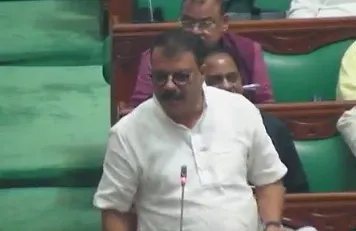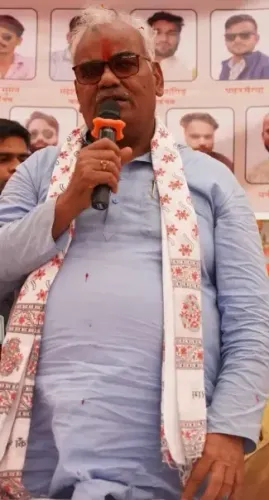Why Was There Chaos in the MP Assembly Over BJP Minister Vijay Shah's Presence?

Synopsis
Key Takeaways
- Political tensions continue to escalate between the ruling BJP and opposition Congress in Madhya Pradesh.
- The issue of respect for the Armed Forces remains a critical point of contention.
- Speaker Tomar struggles to maintain order amidst ongoing protests.
- Vijay Shah faces significant opposition over his remarks regarding military personnel.
- The adjournment of the House reflects the challenges of governance in a politically charged environment.
Bhopal, Aug 1 (NationPress) The Madhya Pradesh Assembly erupted in chaos on Friday as members from the ruling BJP and opposition Congress engaged in a heated exchange, each accusing the other of disrespecting the Indian Armed Forces.
The turmoil commenced during the 'Question Hour' session and persisted until Speaker Narendra Singh Tomar adjourned the proceedings until August 4 (Monday). This disruption was triggered when senior BJP MLA and former home minister Bhupendra Singh questioned illegal encroachments on land designated for Tribals in Khurai Assembly seat, which he has represented for several years.
Several other MLAs echoed similar concerns and sought answers from the government. Given that the topic pertained to Tribal lands, Vijay Shah, the Minister in charge of Tribal Affairs, attempted to respond to the concerns raised. However, upon his attempt to address the House, Congress MLAs collectively objected to his presence, arguing that anyone who makes derogatory remarks about Army officer Colonel Sofiya Qureshi does not merit a position in the cabinet.
“Anyone who insults the Army should not remain in office. Vijay Shah must be dismissed from the cabinet. Why is the BJP defending him?” said Congress MLA Umang Singhar, the Leader of Opposition in the MP Assembly. Speaker Tomar made repeated appeals to the Congress MLAs, emphasizing the importance of the discussion at hand; yet, the opposition steadfastly opposed Shah's presence.
Later, when Congress MLA Arif Masood posed a question concerning relief and rehabilitation for the Bhopal gas tragedy, Vijay Shah, who oversees that department, again sought to respond. Yet again, opposition members rose, insisting on Shah's resignation for disrespecting a woman Army officer. This time, Congress legislators even moved into the Well of the House, chanting, “Vijay Shah 'istifa do' (resign), Vijay Shah ko 'barkhaast karo' (sack him).
Despite Speaker Tomar’s requests for calm and order, the Congress members continued their protest. Some senior BJP leaders attempted to mediate with the opposition, but LoP Singhar and several Congress MLAs remained adamant in their calls for Shah’s resignation.
Senior BJP Minister Kailash Vijayvargiya, who also serves as the Parliament Affairs Minister, expressed his frustration with the Congress’s actions, stating, “A party that speaks the language of Pakistan and China, and questions the valor of the Indian Armed Forces, has no right to discuss nationalism.”
Amidst this escalating conflict between the two parties, the Speaker struggled to maintain order in the House. Eventually, when the opposition members did not relent, Tomar adjourned the session until August 4. This marked the second time Vijay Shah found himself in an embarrassing situation since the State Assembly's monsoon session commenced on July 28.
On July 29, when Vijay Shah attempted to present a Bill concerning the Tribal department, Congress MLAs had unitedly opposed his presence once more, forcing him to return to his seat.









